We're now a week into our nationwide lockdown. If you're looking for just the key, verified facts, check in here for rolling live updates.
This live updates article is now discontinued. For the most recent updates, click here.
4:00pm, Wednesday 1 April
The new pricewatch email for New Zealanders to report price gouging at supermarkets has already received 990 emails by 9am this morning, after only launching yesterday.
The Prime Minister said some of those included duplicates and unrelated messages. Many of the reports related to the high price of cauliflower (apparently up to $13 in some supermarkets), hand sanitiser, bread, meat and garlic.
In some cases the high price is due to regular seasonal supply issues, but the Prime Minister said all reports would be investigated.
The email is pricewatch@mbie.govt.nz.
2:00pm, Wednesday 1 April
Today's numbers in infographics:
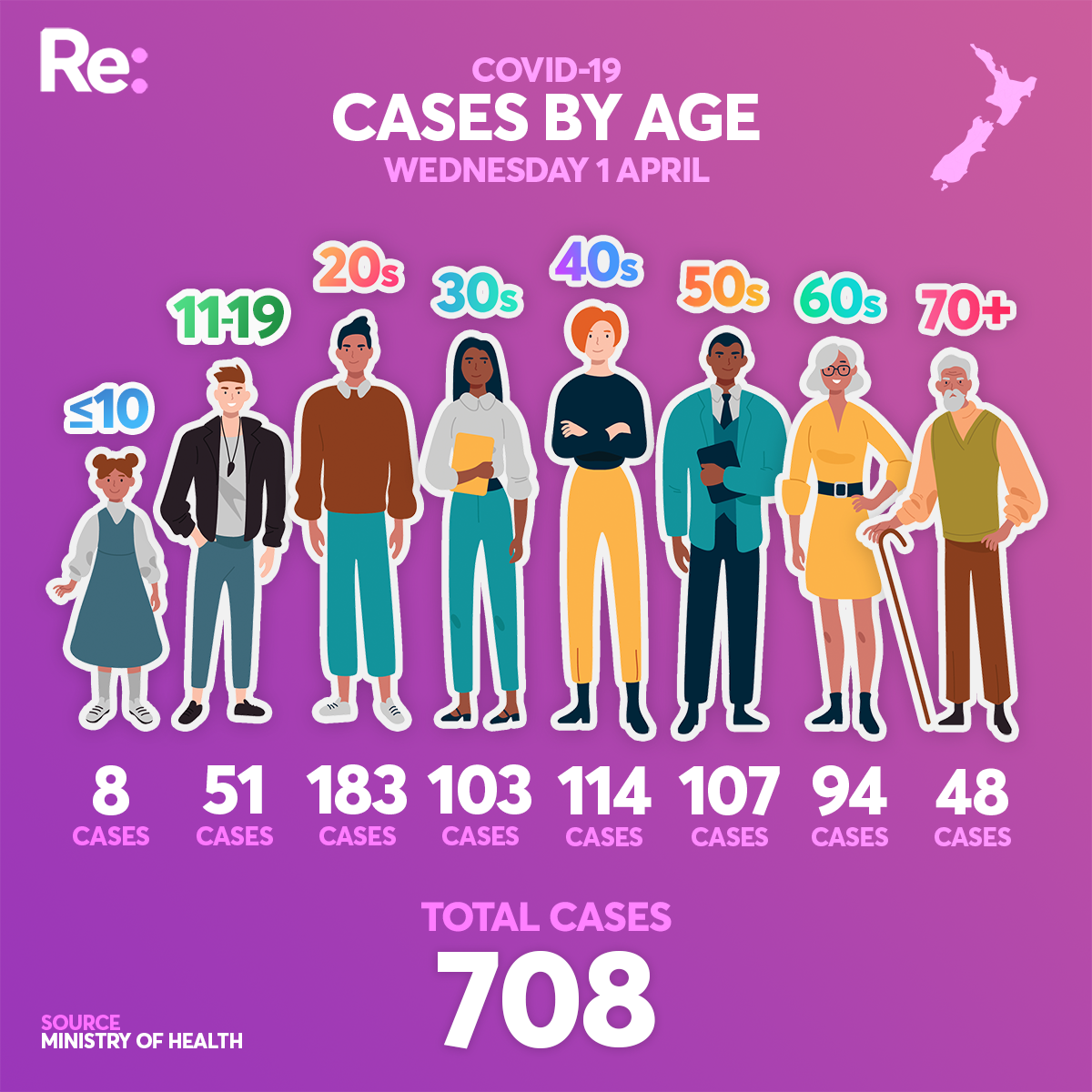
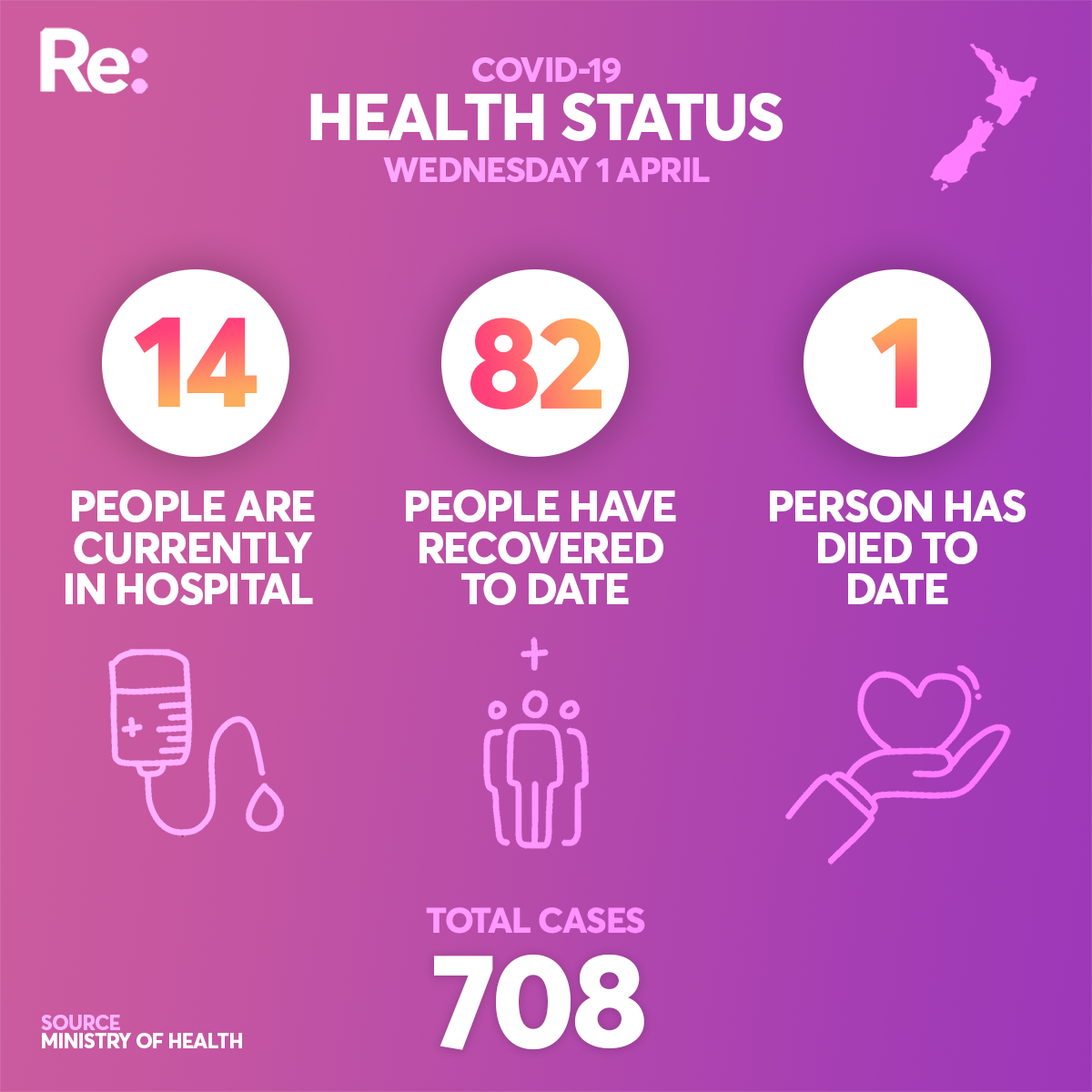
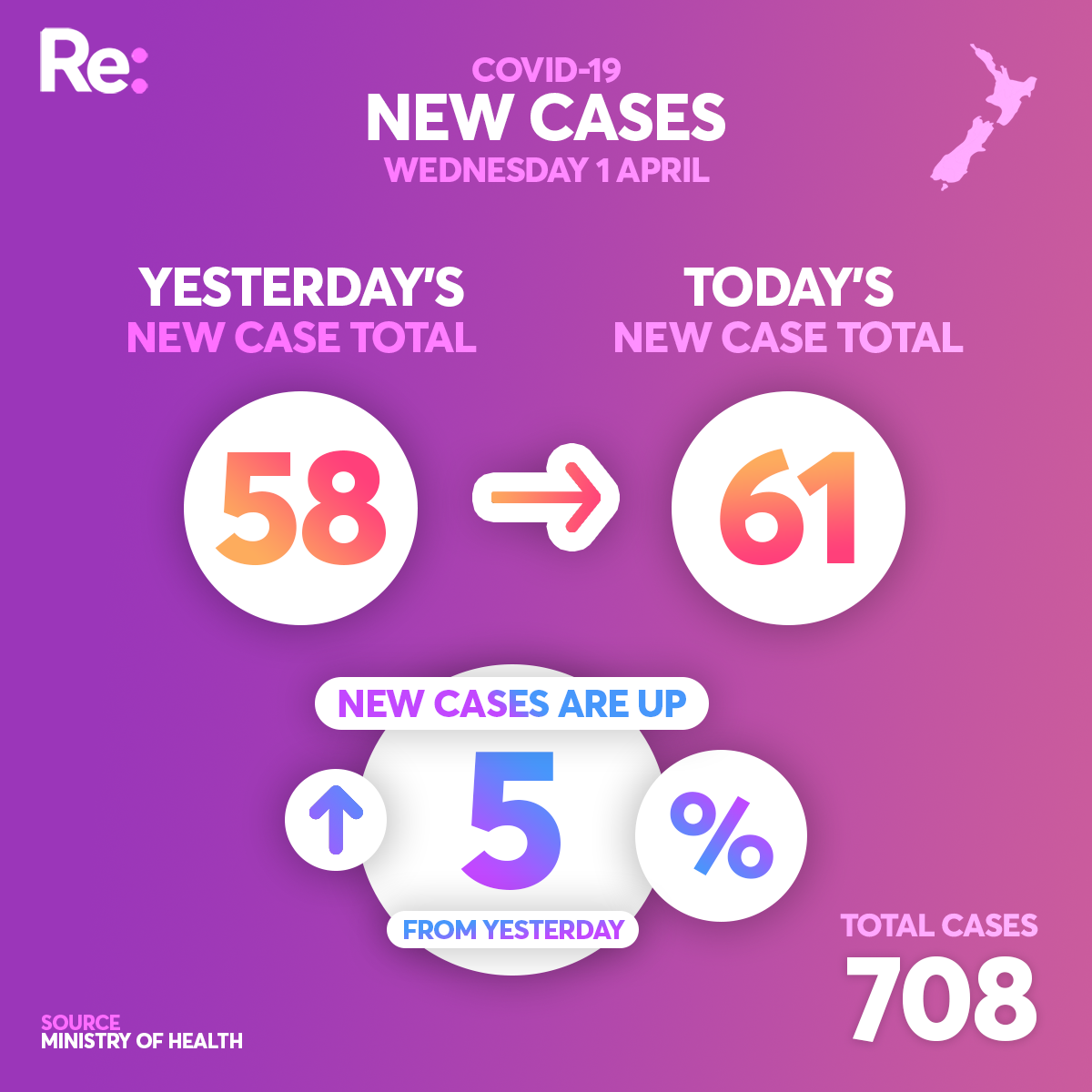

Correction: the map incorrectly shows the Bay of Plenty with 16 confirmed cases, and the Hawke’s Bay with 18. In fact the Bay of Plenty has 18 confirmed cases, and the Hawke’s Bay has 16 confirmed cases as of 1 April 2020.
1:00pm, Wednesday 1 April
Today there are 61 new cases, and no additional deaths.
That brings our total to 708 cases.
82 people have recovered.
14 people are in hospital, with two of those in stable conditions in intensive care.
Just over half of cases are connected to overseas travel.
30% are close contacts of someone else with Covid-19.
1% are community transmission.
There are an average of 1843 tests being done a day. Eight laboratories are doing tests, but by next week this will go up to 10 labs.
4:00pm, Tuesday 31 March
Countdown will have a special hour from 8am-9am for essential service workers. They have also relaxed limits on most food items. Only high-demand products like flour, rice, tinned beans and toilet paper will continue to have a two-item limit. Most other things will now have a six-item limit. In a press release, Countdown says the change was to allow people to visit the supermarket less frequently.
3:00pm, Tuesday 31 March
Supermarkets will be closed on Good Friday (10 April). They will, however, be open on Easter Sunday (12 April), a day which they are normally closed due to Easter trading restrictions.
The Prime Minister says the government wanted to give supermarket workers a “well-earned break” and the chance to restock, but that it needed to be balanced against the need for access to supermarkets.
Usually it is illegal for supermarkets to open on Easter Sunday, but the Prime Minister said the decision was made to avoid people rushing to supermarkets if there were two days of closure.
Testing will be broadened to include people with Covid-19 symptoms but no history of travel or exposure to another case.
2:30pm, Tuesday 31 March
Here are today's updates in infographics:
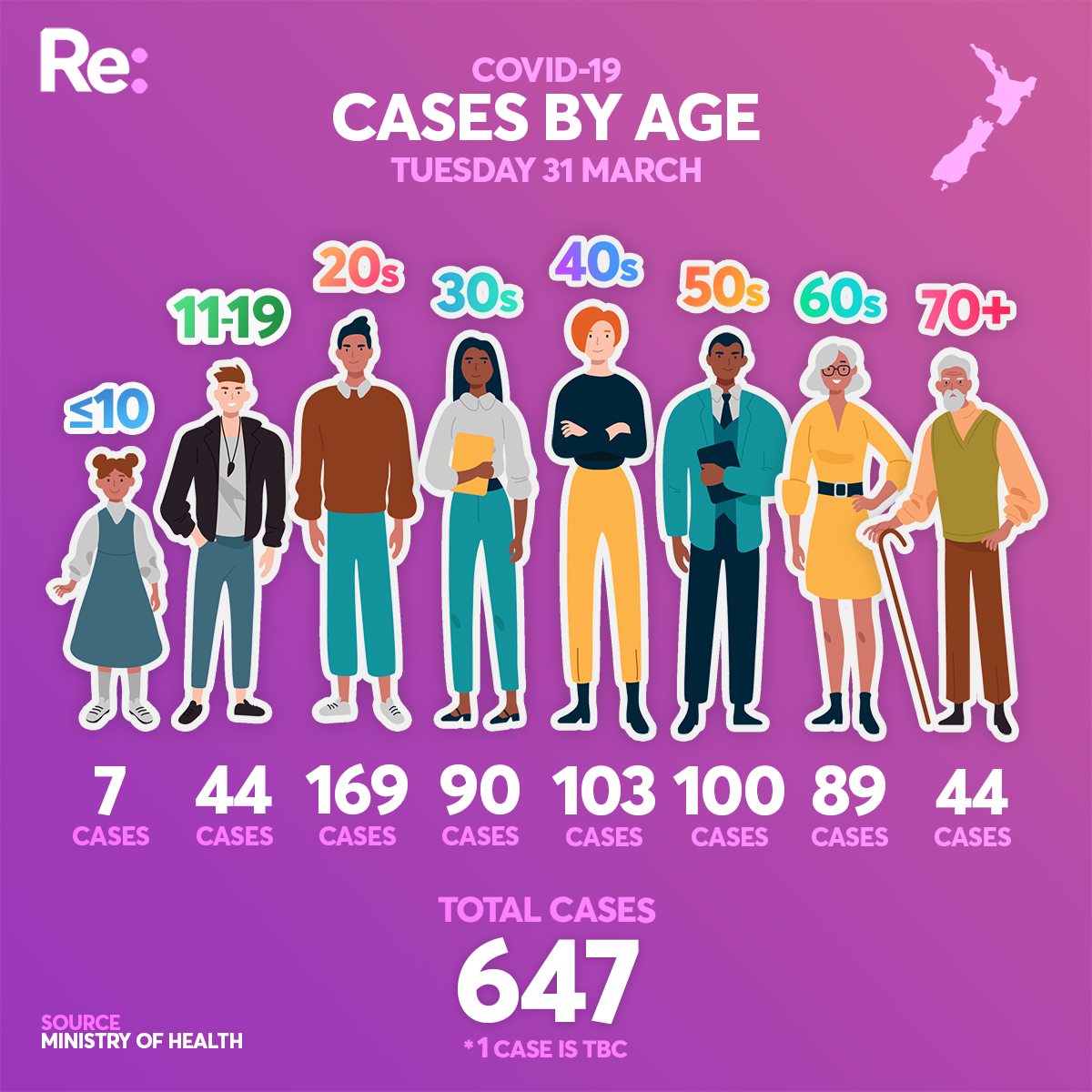
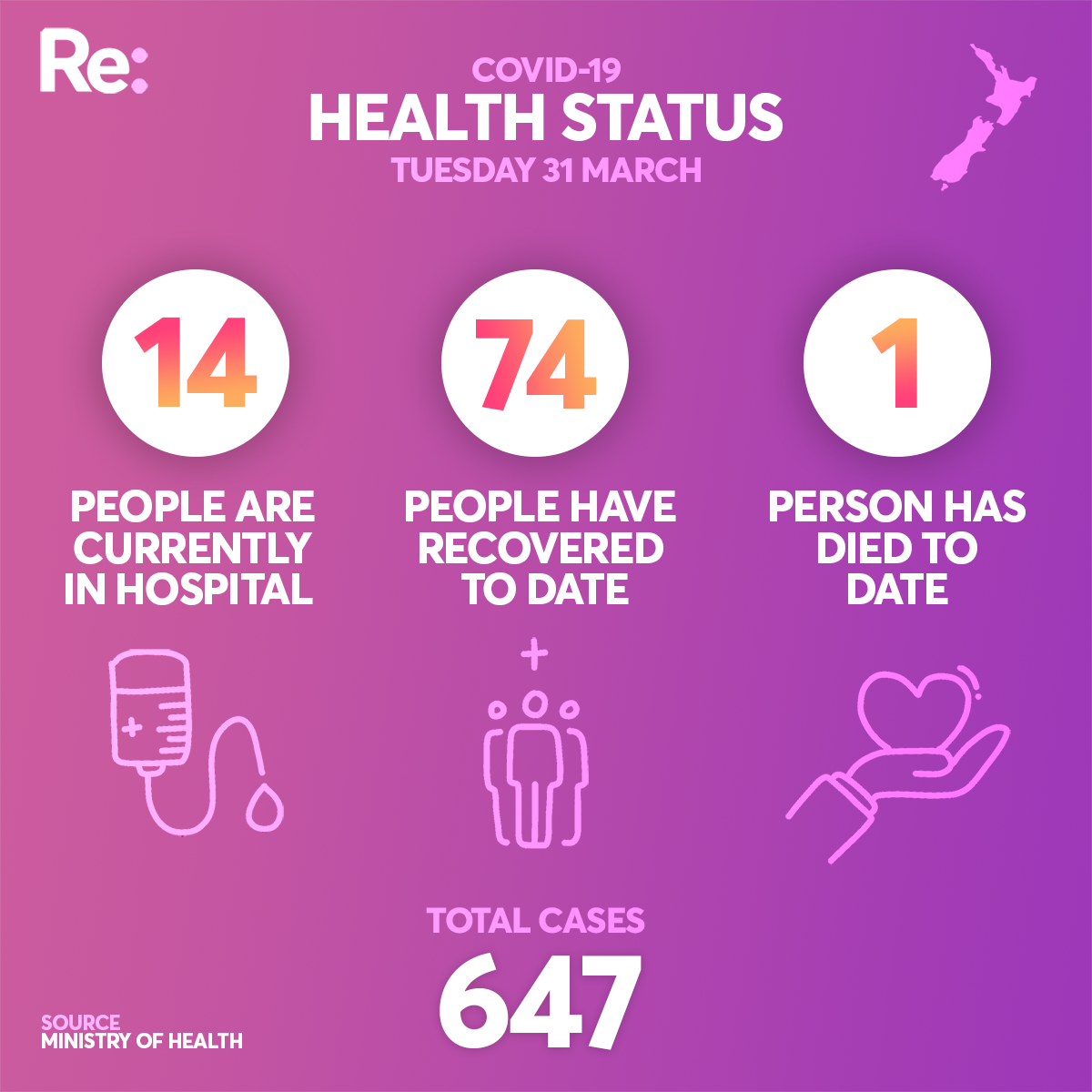
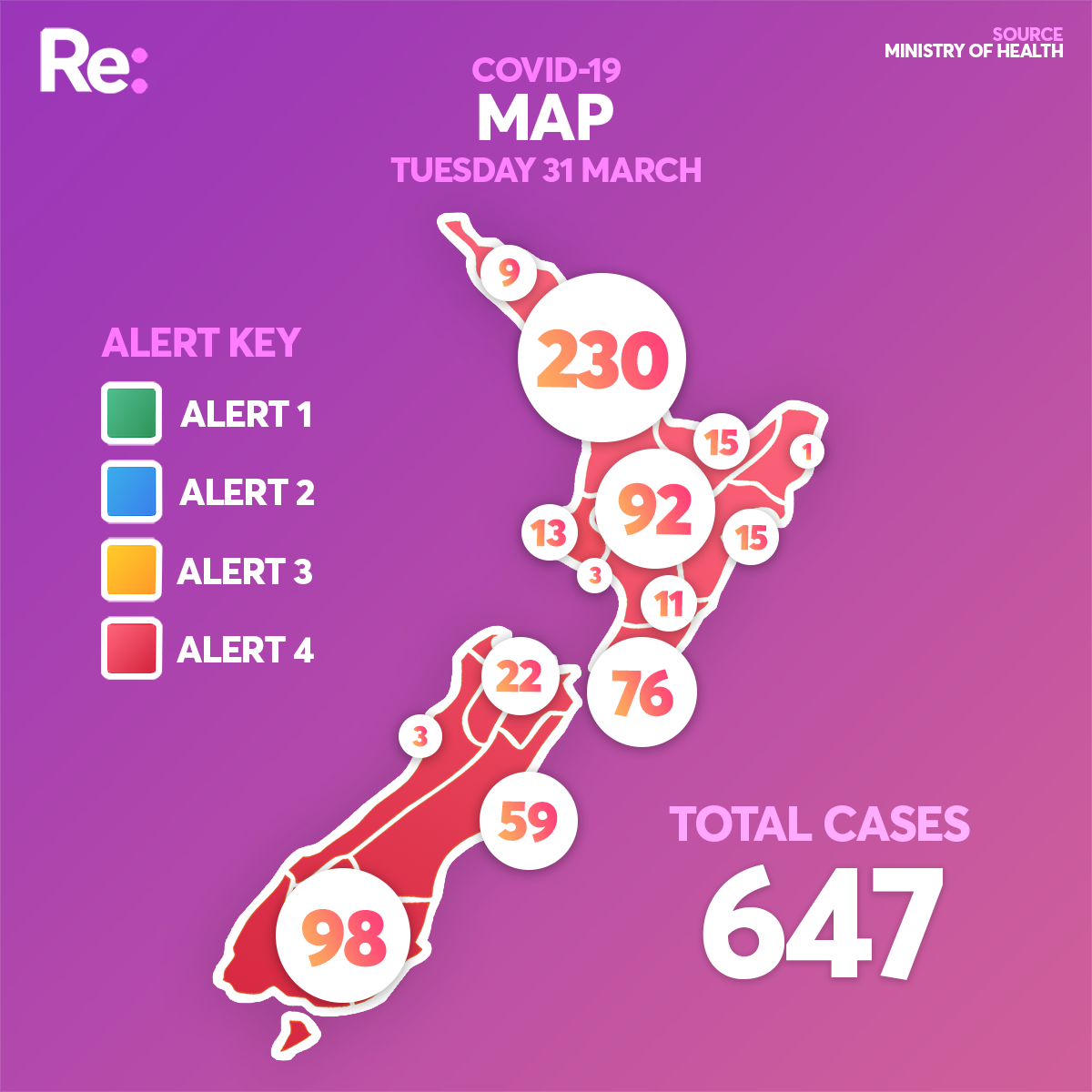
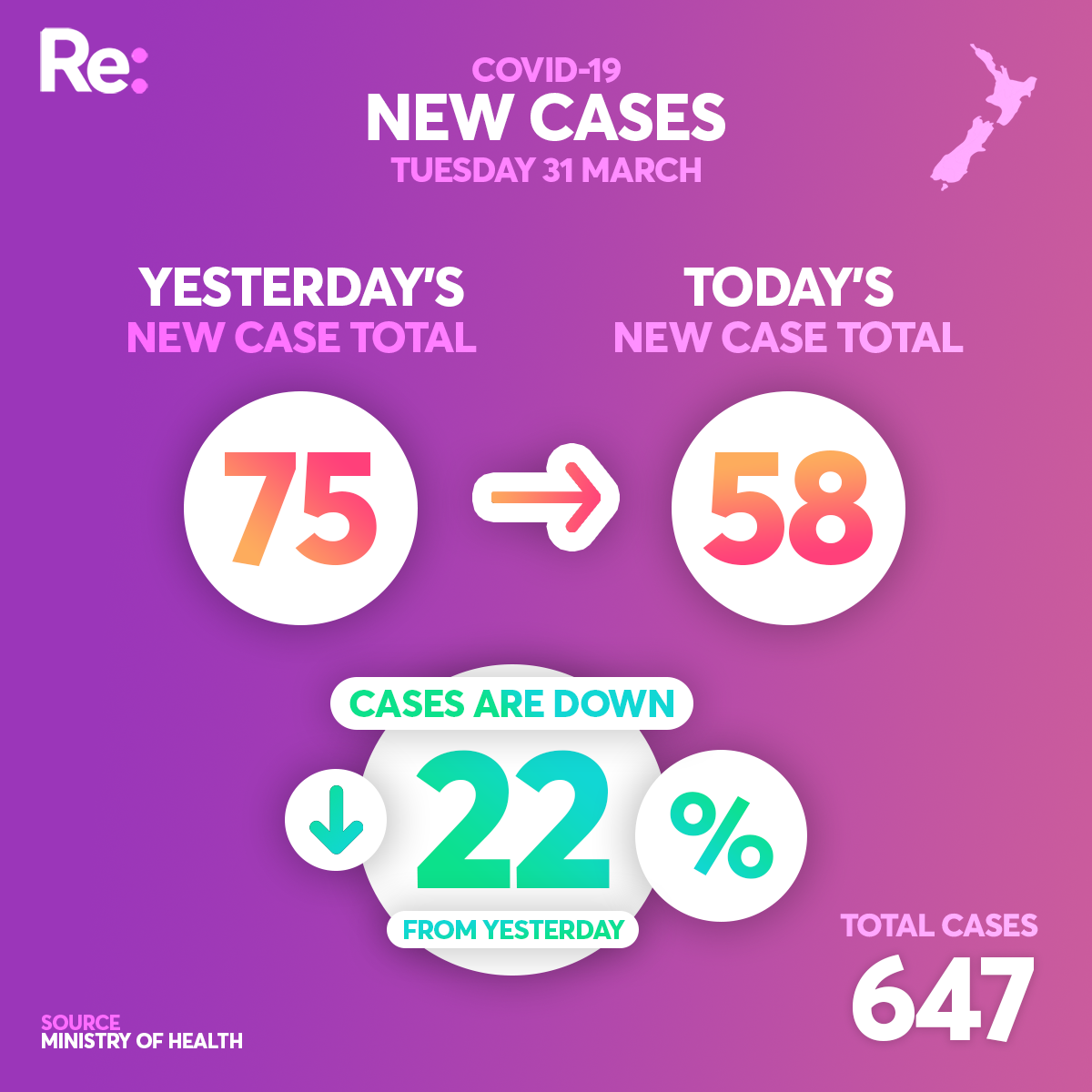
1:30pm, Tuesday 31 March
Today there are 58 new cases, and no additional deaths. That brings our total to 647 cases.
74 people have recovered.
14 people are in hospital, with two of those in stable conditions in intensive care.
Dr Ashley Bloomfield, Director-General of Health says while the number of new cases today is a drop from the last few days, we should expect to continue to see cases increase over the coming 7-10 days.
- 53% of the cases are linked to overseas travel
- 29% are close contacts of someone else with Covid-19
- 1-2% are community transmission, and it’s expected this number will increase
There are an average of 1777 tests being done a day.
The modelling that health officials used to predict the impact of Covid-19 in New Zealand has been released today by the Ministry of Health. Dr Bloomfield says the modelling shows without the lockdown measures currently being taken, “the uncontrolled spread of Covid-19 would clearly exact a high price on New Zealand, in terms of its impact on our healthcare system, our healthcare workers and of course a large number of deaths.”
Civil Defence and mayors and councils have partnered to create a Covid-19 Local Government Response Unit. This is similar to local services that would help people after an emergency, except as Civil Defence director Sarah Stuart-Black says, “Covid is the opposite challenge,” where people need to stay in their homes but still need help to access food and medication.
The call for New Zealanders to stop flushing wet wipes has been repeated. Wet wipes are a major problem for waste systems because they cause large blockages. Sarah Stuart-Black says the use of wet wipes has increased markedly. “Disposing of wet wipes down the toilet leads to blockages - please always put wet wipes in the rubbish not the toilet.”
The State of National Emergency has been extended for seven more days. A declaration only lasts seven days, and as the declaration was made on March 25th, it has been extended. It can be extended any number of times and it is likely it will be extended every week during Alert Level 4, although the two are not exclusively tied to each other. A State of Emergency does things like giving civil defence workers the legal right to manage roads, public places and shelter.
Our environment is improving during lockdown. Air quality tests from NIWA show pollution levels have dropped to nearly zero in some of Auckland’s busiest traffic hotspots.
A NIWA scientist told 1 News it’s some of the largest reductions of pollution seen anywhere in the world. They say it’s a clear sign that New Zealand could reduce emissions to prevent global warming - we just need to stop driving so many cars.
Kiwis in Australia will be able to access that government’s assistance package. Many New Zealanders living across the ditch who had lost work due to Covid-19 were nervous because they are not entitled to government welfare benefits. But Australian Prime Minister Scott Morrison announced New Zealanders will be entitled to Australia’s new Covid wage subsidy scheme.
5:00pm, Monday 30 March
Businesses will be allowed to sell fridges, heaters, blankets and computers online. MBIE has announced an extension of the essential goods list to include a select number of non-food essential goods.
Only things that keep people warm, replace key household appliances, maintain people’s health or allow them to work, study or stay connected from home will be allowed. Businesses will only be able to sell online or by phone, and must have all products delivered - no shops are allowed to open.
MBIE says if businesses “are too generous in their interpretation of what is “essential” or flout these rules,” the Government will take action against them.
4:00pm, Monday 30 March
A new email to report inflated prices at supermarkets has been launched - pricewatch@mbie.govt.nz
There have been reports of price gouging in the last few days. “It is more important than ever that prices are fair and reasonable.” says Prime Minister Jacinda Ardern. “No one wants to see anyone take unfair financial advantage from this extraordinary period.”
People who see inflated prices can report them via the new email address, ideally with a photo or a copy of a receipt.
A cluster of cases in Matamata has been linked to a St Patrick's Day party at a bar. The Prime Minister says this shows the need for staying home - “These are all commonplace gatherings we normally take for granted but have been proved to be places where this virus can spread successfully.”
The Government’s Cabinet (made up of the top 20 Ministers) has met today for its weekly meeting via Zoom video call - the Prime Minister said she believes it's the first time Cabinet has ever been held in this way.
6126 health professionals have now come out of retirement or returned to the workforce to support the Covid-19 response.
1:00pm, Monday 30 March
Todays updates in infographics:
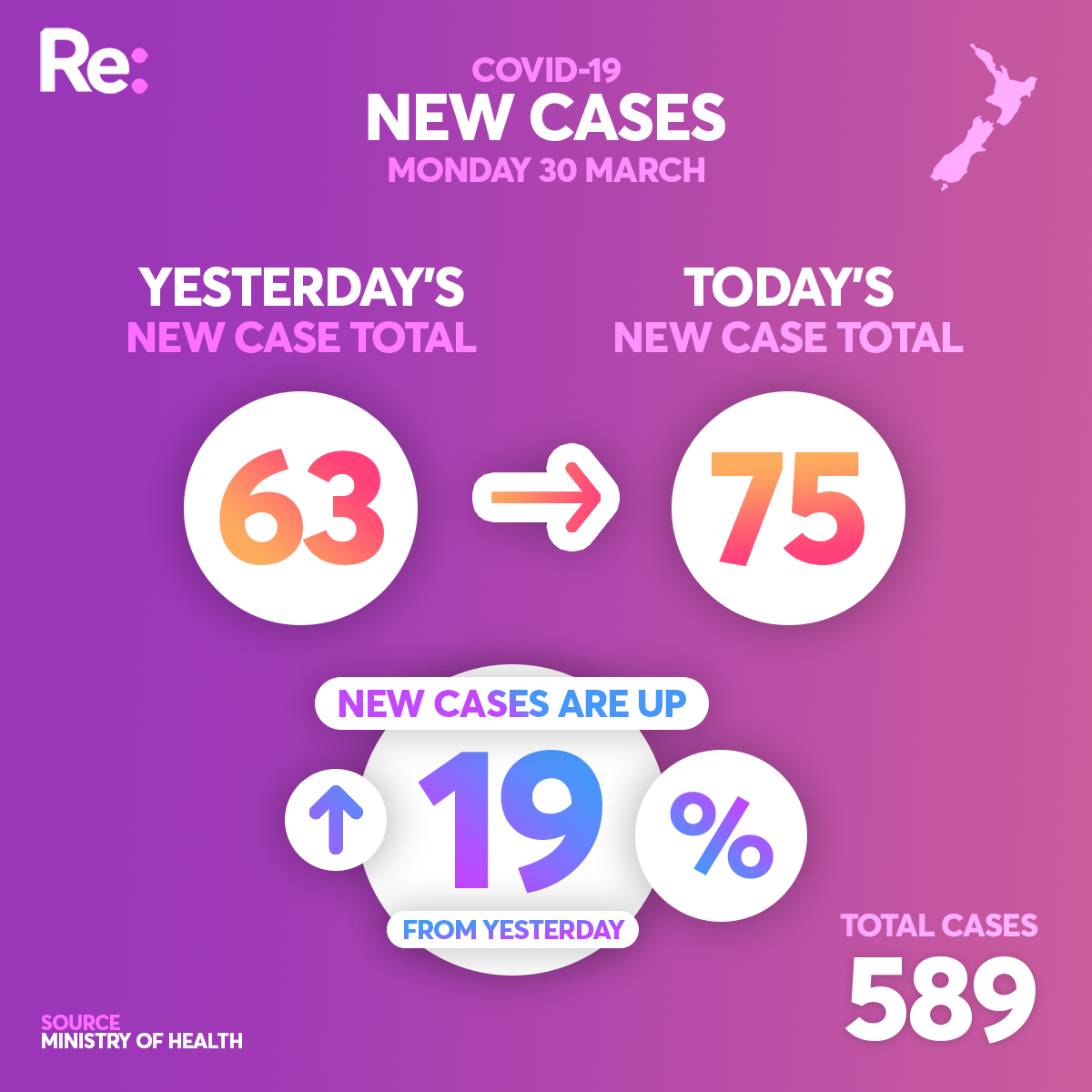
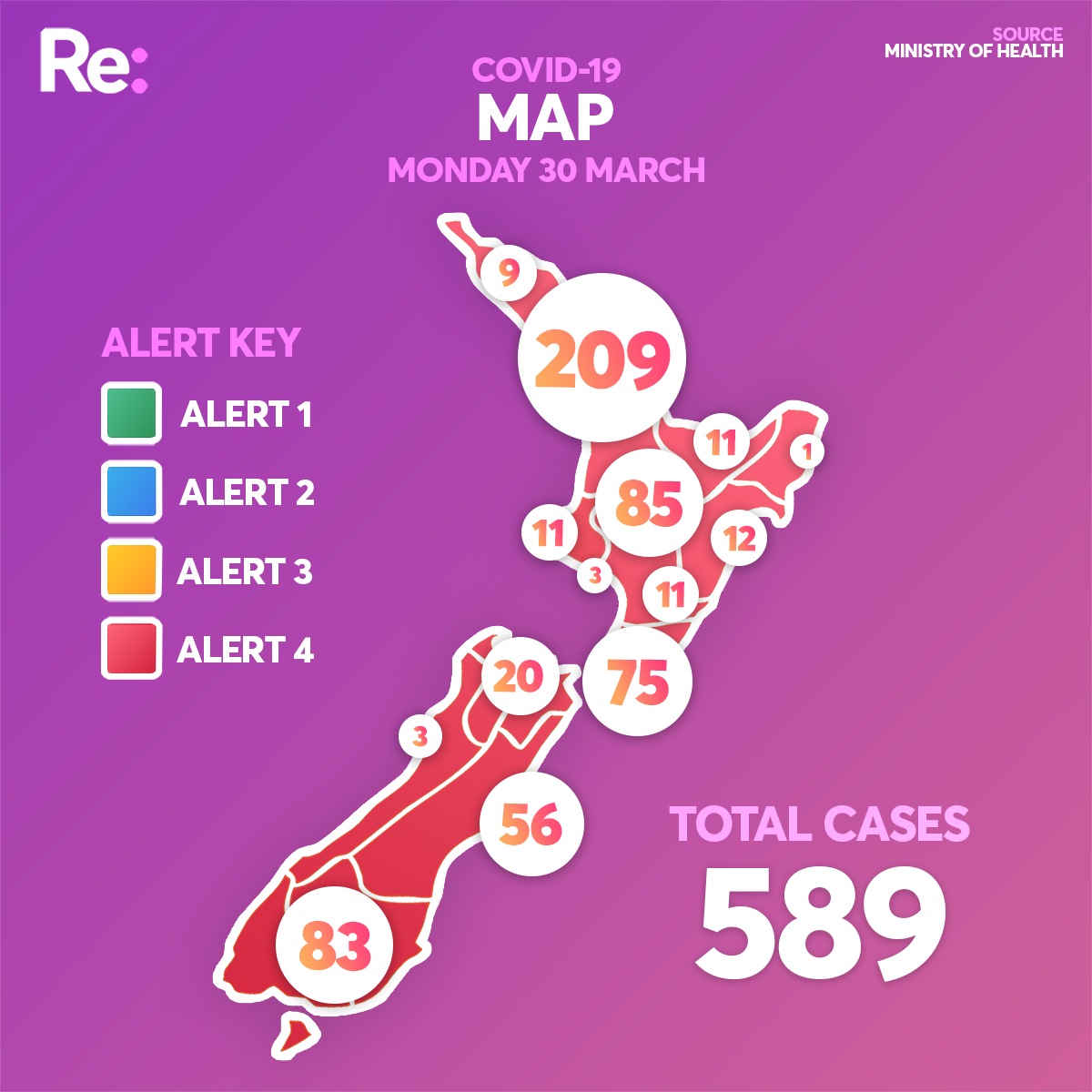
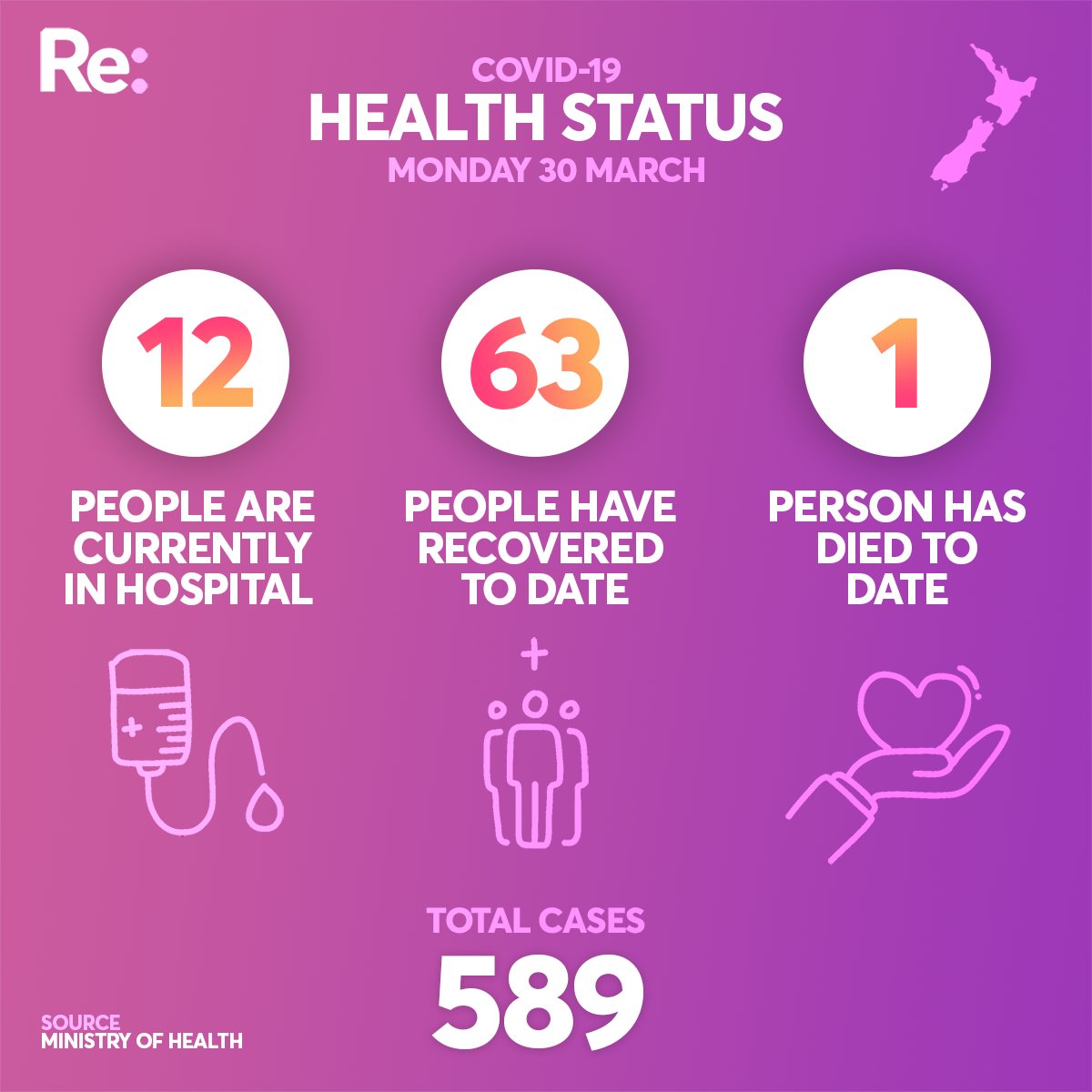
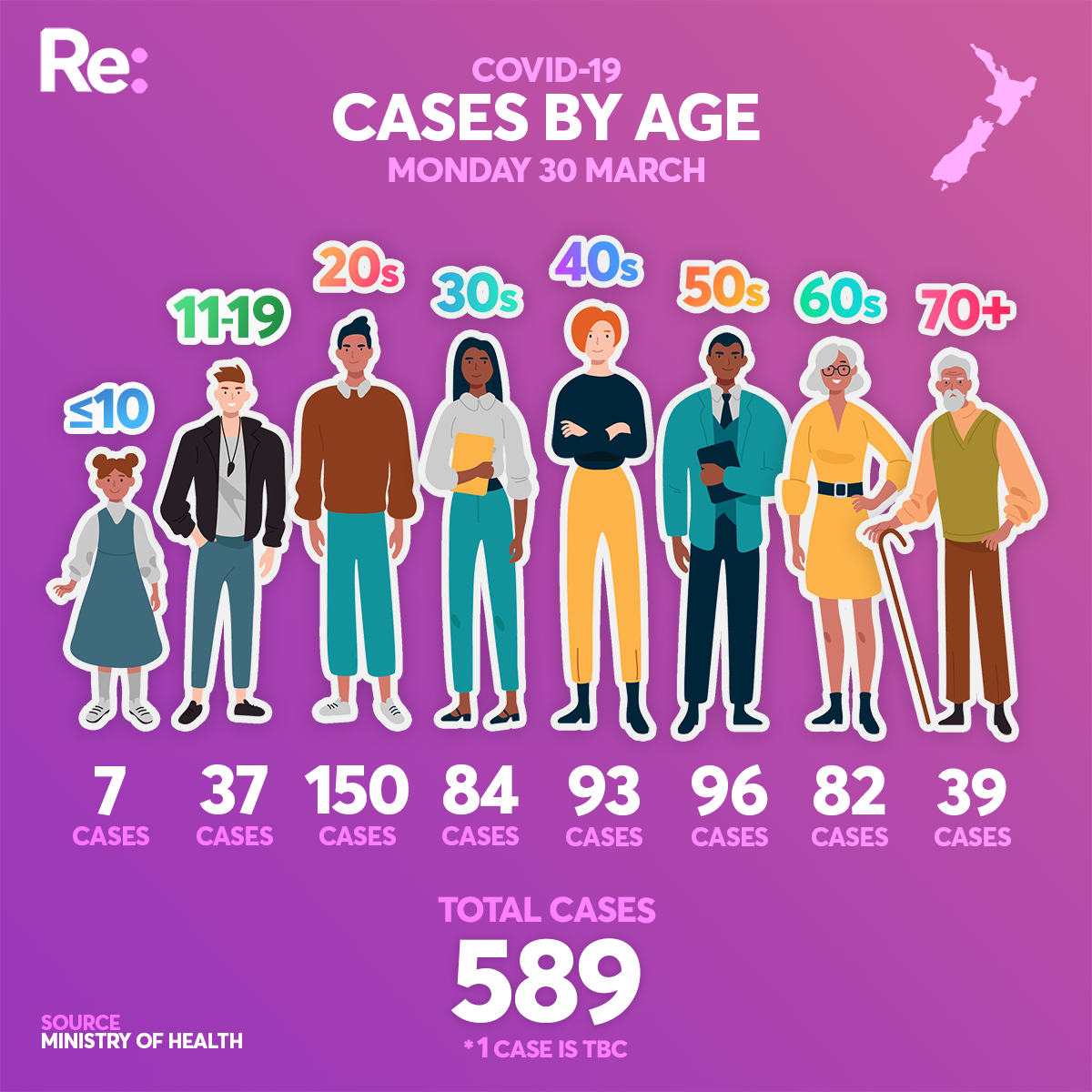
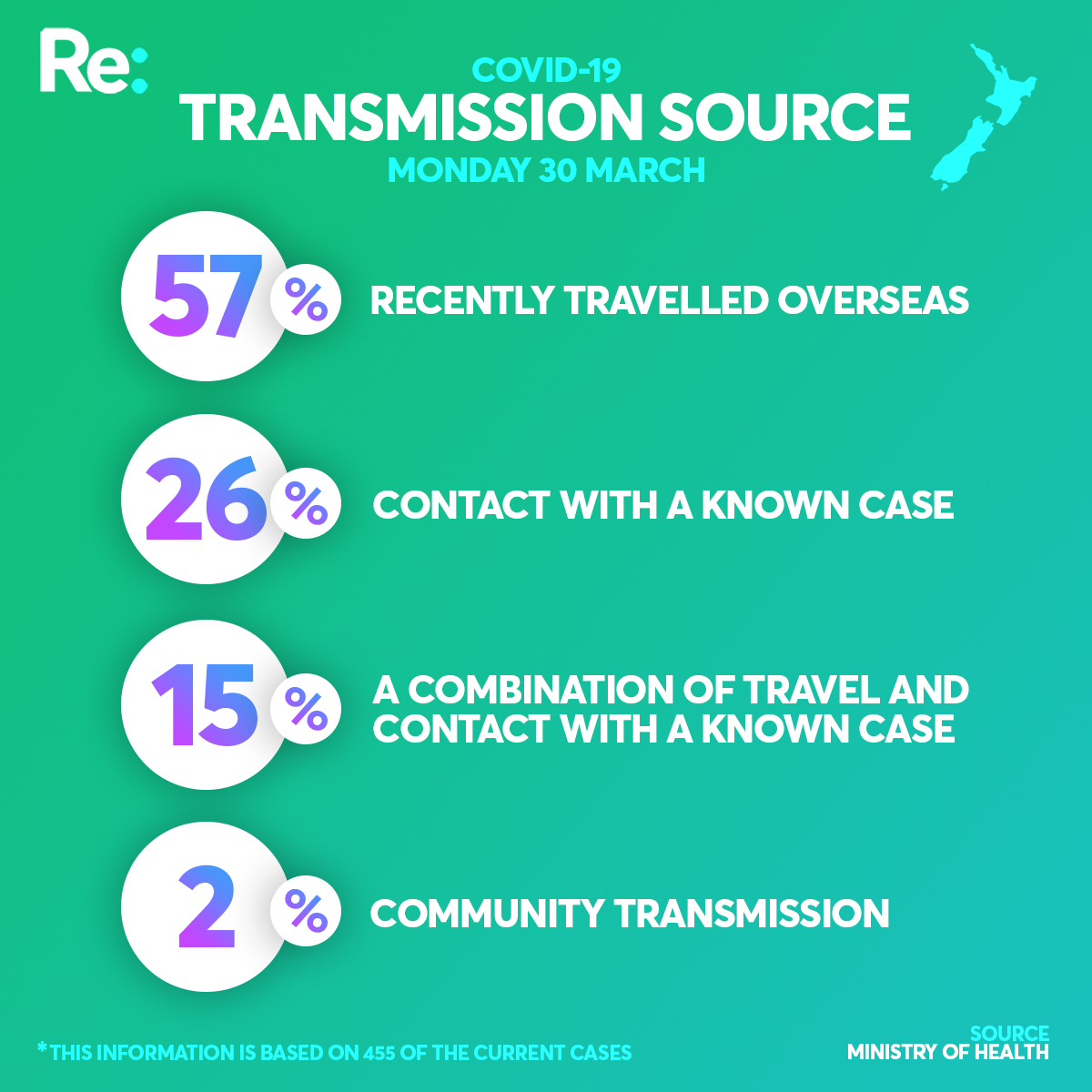
1:00pm, Monday 30 March
There are 76 new cases of Covid-19 today. The total is now 589.
There have been no additional deaths since yesterday.
63 people have recovered. 12 people in hospital, 2 are in intensive care, 3 are expected to be discharged soon.
An average of 1728 tests a day are being done.
Data about where cases have come from has been released by the Ministry of Health:
- 57% of cases have a direct link to overseas travel
- 26% are close contacts with another case
- 15% are a combination of overseas and/or close contacts
- 2% are community transmission (that’s around 10 cases that are definitely community transmission)
If you are wanting a regular flu vaccine, the Ministry of Health is asking that you wait unless you are part of one of the following vulnerable groups:
- Pregnant women
- People with diabetes, heart or lung conditions
- 65 years or over
- Children under 4 who’ve had a hospital stay for asthma or breathing problems
- Healthcare workers
If you are not one of these groups, “please wait” says Dr Ashley Bloomfield, Director-General of Health. There are more than enough vaccinations for everyone (400,000 more than last year), but the Ministry of Health is prioritising getting them to vulnerable groups first. “You should not be seeking a vaccination if you are not in one of those groups until mid-April.”
Police have arrested three people for breaching lockdown. Two of them were released without charge, and the other is still in police custody because they had other “outstanding matters” says Police Commissioner Mike Bush.
They had previously been warned and “decided they wouldn’t oblige, so we obliged for them,” says Commissioner Bush.
There have been 4200 reports of lockdown breaches to the new www.105.police.govt.nz website - so many that the site temporarily crashed. 1000 of the reports were related to businesses, and the others to people.
“It shows how determined Kiwis are to ensure that everyone complies with this,” says Commissioner Bush.
Lockdown breaches include tourists who “think it's okay to drive around the country in their campervans”. Commissioner Bush says there have been reports from essential service workers who needed to travel for work who “couldn't move on the Desert Road for campervans”.
9:00am, Monday 30 March
Supermarket workers at Pak'nSave, New World and Four Square will get a 10% bonus for working through the lockdown period. Foodstuffs, the company that owns the three chains said the bonus is for all front-line, distribution and transport workers.
Rival supermarket Countdown has not yet announced if it will make a similar move.